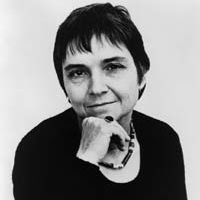The Afterwake by Adrienne Rich: Summary
In the first stanza the speaker is addressing the patient. She says to him that she has nursed his nerves to rest; but while doing so her own nerves have been roused. That is, she has mentally strained herself. Now she thinks that she has to spend a few bad hours by herself.

Adrienne Rich (1929-2012)
It means that the time ahead is not so easy either. She sees that the man is soundly sleeping inside the room and he is safe inside. But the nurse is alone outside. She sits heavily (slumps) on ‘his’ front parlor. This means that the place belongs to the man. We do not know whether she is a professional nurse or a relative or a wife who is taking care of the man. What we know for certain is that he has problems with his nerves and it is nerve-breaking for her to nurse him. She sees the plight (condition) of women like herself in her society when she compares herself with a midwife. The simile of the midwife is elaborate and striking. The midwife being compared to herself is such a woman who helps the delivery of the child during the night; she has to clean all the blood stained clothes, prepare water and tea for the woman; and then sets out to her own home which is five miles away. Like herself, the midwife would have the shrieking sounds of the child in her head because of the sleepless night.
In the second stanza the speaker is speaking in a different tone. She may or may not be speaking to the same man sleeping safely inside the house. But she is in a different mood and is talking about different things and without the tiredness and frustration of the first stanza. She has changed. She begins with a ‘yes’ as if she had been asked a question by someone or as if she has been thinking about a question in her own mind. In the first stanza, she saw that she was describing her normal experience as a heavy burden, and she was rather tired and frustrated. Her issue now is that she has to go ahead with the other woman, ‘she’. She is no longer thinking or speaking about the past or others but thinking of the present situation in terms of the journey ahead. She has to go and she is determined to. She says that she is with ‘her’ now, and before them there is the road. The road is ‘livid’, which means purple blue. But the second meaning of the word creates a pun: the word ‘livid’ also means ‘angry’. It may be the road of rebellion against the old and traditional patriarchal orders of the masculine society which the women are leaving behind as the night and in search of the day of their freedom and independence. According to the speaker, the houses are shut on the side of the road. That suggests that there will be no guide and support, no help and protection on their way ahead. The houses are therefore associated with the night and therefore with the male traditions of keeping women in the darkness of ignorance and injustice. The speaker says that their legs are feeling tight because of fatigue (tiredness) as they are moving under the morning star. She says that the morning star is ‘coal-blue’ which means that it is dawn, neither dark nor fully bright. Like the heavy legs, their ‘load of unexpired purpose’ is also very big (colossal). The load of purpose is however draining (dropping) slowly on the way, and it is likely to finish on the way before the “scissors of cockcrow nip (cut) the air”. This means that the load of aim will also slowly fall and reduce as they go on in the journey and they will have become less ambitious before they die.
Cite this Page!
Sharma, Kedar N. "The Afterwake by Adrienne Rich: Summary" BachelorandMaster, 16 Nov. 2013, bachelorandmaster.com/britishandamericanpoetry/the-afterwake-summary.html.
